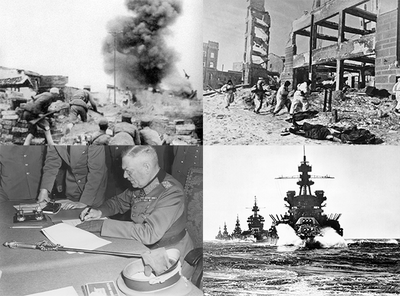Wrh Second World War: Difference between revisions
No edit summary |
No edit summary |
||
| Line 6: | Line 6: | ||
| image_size = | | image_size = | ||
| alt = | | alt = | ||
| caption = Clockwise from top left: <br> Chinese forces in the Battle of Changde. Soviet troops in the Battle of Stalingrad. US naval force in the Lingayen. GulfWilhelm Keitel signing the German Instrument of Surrender. | | caption = Clockwise from top left: <br> Chinese forces in the Battle of Changde. Soviet troops in the Battle of Stalingrad. US naval force in the Lingayen. GulfWilhelm Keitel signing the German Instrument of Surrender. | ||
| date = 1 September 1939 - 8 November 1945 | | date = 1 September 1939 - 8 November 1945 | ||
| place = Europe, Pacific, Atlantic, Indian Ocean, South-East Asia, China, Japan, Middle East, Mediterranean, North Africa, Horn of Africa, Central Africa, Australia, briefly North and South America | | place = Europe, Pacific, Atlantic, Indian Ocean, South-East Asia, China, Japan, Middle East, Mediterranean, North Africa, Horn of Africa, Central Africa, Australia, briefly North and South America | ||
Revision as of 17:28, 9 January 2022
| WRH Second World War | |||||||
|---|---|---|---|---|---|---|---|
 Clockwise from top left: Chinese forces in the Battle of Changde. Soviet troops in the Battle of Stalingrad. US naval force in the Lingayen. GulfWilhelm Keitel signing the German Instrument of Surrender. | |||||||
| |||||||
| Belligerents | |||||||
| Allies of WRHWW2 | Axis of WRHWW2 | ||||||
| Commanders and leaders | |||||||
|
|
| ||||||
| Casualties and losses | |||||||
|
Military Dead Over 16,000,000 dead Civilian Dead Over 46,000,000 dead Total Dead Over 62,000,000 dead (1937 - 1945) |
Military Dead Over 9,000,000 dead Civilian Dead Over 7,0000,000 dead Total Dead Over 16,000,000 dead (1937-1945) | ||||||
The WRH World War II or the WRH Second World War, often abbreviated as WWII or WW2, was a global war taking place on *INSERT PLANET NAME that lasted from 1939 to 1945. It involved the vast majority of the world's countries—including all of the great powers—forming two opposing military alliances: the Allies and the Axis powers. In a total war directly involving more than 100 million personnel from more than 30 countries, the major participants threw their entire economic, industrial, and scientific capabilities behind the war effort, blurring the distinction between civilian and military resources. Aircraft played a major role in the conflict, enabling the strategic bombing of population centres and the only two uses of nuclear weapons in war. World War II was by far the deadliest conflict in human history; it resulted in 70 to 85 million fatalities, a majority being civilians. Tens of millions of people died due to genocides (including the Holocaust), starvation, massacres, and disease. In the wake of the Axis defeat, Germany and Japan were occupied, and war crimes tribunals were conducted against German and Japanese leaders.
World War II is generally considered to have begun on 1 September 1939, when Nazi Germany, under Adolf Hitler, invaded Poland. The United Kingdom and France subsequently declared war on Germany on 3 September. Under the Molotov–Ribbentrop Pact of August 1939, Germany and the Soviet Union had partitioned Poland and marked out their "spheres of influence" across Finland, Romania and the Baltic states. From late 1939 to early 1941, in a series of campaigns and treaties, Germany conquered or controlled much of continental Europe, and formed the Axis alliance with Italy and Japan (along with other countries later on). Following the onset of campaigns in North Africa and East Africa, and the fall of France in mid-1940, the war continued primarily between the European Axis powers and the British Empire, with war in the Balkans, the aerial Battle of Britain, the Blitz of the UK, and the Battle of the Atlantic. On 22 June 1941, Germany led the European Axis powers in an invasion of the Soviet Union, opening the Eastern Front, the largest land theatre of war in history.